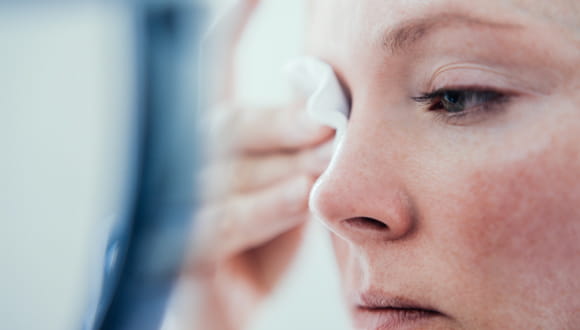When you have something in your eye, it's always annoying, sometimes painful, but usually temporary. Your instinct is to blink it out — which typically works.
But when it's your eyelid that's red, itchy or puffy, it's a different kind of frustrating. You know there's no blinking away eyelid irritation, but you can't help but try — over and over and over...
"If your eyelids are irritated, it's because something is causing them to become inflamed — of which there are many different potential causes," says Dr. Amina Malik, oculoplastic surgeon at Houston Methodist. "The irritation is typically either felt at the edge of your eyelids, where your eyelids and eyelashes meet, or on the inner surface of your eyelids
Eyelid inflammation can cause a wide range of symptoms, including:
- Itchy, red or swollen eyelids
- A gritty feeling in the eye
- A burning sensation in the eye
- Loss of eyelashes
- Excessive blinking
- Excessive tearing
- Crusting on the eyelids
- Dry eyes
"One doesn't necessarily experience all of these symptoms, just the ones that coincide with the specific cause of their inflammation," adds Dr. Malik. "This is an issue that's typically chronic, but, with the help of an eye specialist, eyelid irritation and inflammation can be manageable."
What causes eyelid irritation?
While eyelid inflammation is common, it's a complex condition with many causes, including:
- The oil glands in your eyelid becoming clogged, which is also called blepharitis and often associated with rosacea
- Mites or lice in eyelash follicles
- Allergic dermatitis, whose triggers include eye makeup, eye wash, eye cream, false lashes, airborne allergens and eyedrops
- Atopic dermatitis, due to eczema or psoriasis
- Bacterial infection
"Given the wide range of both causes and symptoms of eyelid inflammation, the first step in alleviating or even preventing your symptoms is to get a better understanding of the underlying cause of your irritation. This isn't something you can do yourself at home, so it's important to be evaluated by an eye specialist," recommends Dr. Malik.
How to soothe eyelid irritation
Whether your eyelids are red and puffy or itchy and crusty, here are five tips for relieving eyelid irritation:
1. Use a warm compress
"To help relieve eyelid irritation, try applying a warm compress to your eyelids — which can help improve circulation and reduce inflammation," recommends Dr. Malik. "It can also help unclog any clogged oil glands that may be causing your symptoms, as heat melts oil."
The key, however, is to make sure whatever you use as a warm compress is clean and retains heat. A warm washrag, for example, will lose its warmth rather quickly.
"I recommend taking a handful of uncooked rice, placing it in a clean sock, tying it and microwaving it for 10-15 seconds," says Dr. Malik, who advises to always check the temperature of the compress with your hand to ensure it's not too hot before placing it on your eyes. "This should be de done for 5 to 10 minutes once or twice daily."
2. Wash your eyelids
Several of the causes of eyelid inflammation can be relieved by improved eyelid hygiene.
Dr. Malik recommends cleaning your eyelid with a 50/50 mixed solution of baby shampoo and warm water.
"Especially if you're noticing crusting, you can try carefully washing your eyelids with a Q-tip or cotton swab — swabbing from where the eyelashes emerge from the margin of your eyelid. I recommend using a new clean swab for each eyelid, just to be sure you don't spread any bacteria from one eyelid to the next," explains Dr. Malik.
3. Avoid potential irritants
When your eyelids are irritated, you may find it helpful to wear glasses instead of contact lenses and forgo wearing any eye makeup until your symptoms have cleared up.
"While it's rare for contact solutions and eye makeup to be the source of eyelid inflammation, they can further aggravate any existing inflammation or contribute to already clogged oil glands," explains Dr. Malik.
4. Take steps to prevent future irritation
When eyelid irritation flares up, taking notes about any recent changes in your eye care routine may help with diagnosis or future prevention of your eyelid inflammation. While this step doesn't necessarily help fix your current flare-up, it's important to do while the circumstances surrounding your irritation are fresh on your mind.
Additional steps you can take to prevent eyelid irritation:
- Avoid touching your eyes, especially with unwashed hands
- Remove makeup before going to sleep; toss out old makeup
- Maintain good eyelid hygiene with daily cleansing and warm compresses
5. See an eye specialist
Probably the most important and effective way to soothe eyelid irritation is to consult with an eye specialist. In addition to the recommendations above, some cases of eyelid inflammation require treatment with prescription medications, including:
- Topical and oral antibiotics
- Topical steroid eye drops
- Immunomodulatory drugs
"An eye specialist will identify what the specific trigger for your eyelid irritation is and prescribe targeted treatment for it," explains Dr. Malik. "For instance, if your symptoms are caused by demodex mites in the eyelid, a specialized cleaning routine will be recommended."
Yet another reason to see an eye specialist is because prolonged, untreated eyelid inflammation can progress into more serious eyelid changes, such as scarring and loss of eyelashes.
"There's really no cure for blepharitis, but an eye specialist can help you understand how to better manage your condition in order to help reduce your risk of future flare-ups, as well as prevent a more serious complication from developing," adds Dr. Malik.
Need care now?
Houston Methodist Virtual Urgent Care offers on-demand video visits from wherever you are, no appointment needed. Our board-certified providers are available 24/7 to address many common health issues.








